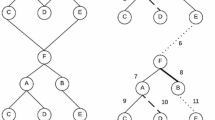Abstract
The use of orthogonal variable spreading factor codes as channelization codes in downlink give rise to code blocking probability due to orthogonal nature of codes. This will further lead to increase in call establishment delay to locate a suitable code which can be assigned to new call request. Code blocking is mainly due to fragmentation of lower rate calls in code tree, which blocks capacity of higher rate codes and consequently blocking of higher rate call requests. In this paper, an assignment approach is proposed which addresses fragmentation due to scattered codes i.e. external fragmentation and internal fragmentation associated with non-quantized rates too. The code tree is virtually divided in two portions, one for quantized and another for non quantized rates. This will lead to reduction in number of code searches before assignment of call to a code. In addition, data calls are queued in buffer to handle voice calls. The data calls share the capacity of a assigned code, to reduce code blocking of real time calls. The data calls are handled using a code of higher capacity for most of the time which reduces their call duration. The proposed scheme is compared with existing novel schemes to show its ascendancy over them.





Similar content being viewed by others
References
Adachi, F., Sawahashi, M., & Suda, H. (1998). Wideband DSCDMA for next-generation mobile communications systems. IEEE Communications Magazine, 36, 56–69.
Adachi, F., Sawahashi, M., & Okawa, K. (1997). Tree structured generation of orthogonal spreading codes with different lengths for forward link of DS-CDMA mobile radio. IEE Electronics Letters, 33, 27–28.
Dahlman, E., & Jamal, K. (1996). Wide-band services in a DS-CDMA based FPLMTS system. In Proceedings of IEEE Vehicular Technology Conference (Vol. 3, pp. 1656–1660).
Tseng, Y. C., Chao, C. M., & Wu, S. L. (2001). Code placement and replacement strategies for wideband CDMA OVSF code tree management. In Proceedings of the IEEE GLOBECOM (Vol. 1, pp. 562–566).
Park, J. S., & Lee, D. C. (2003). Enhanced fixed and dynamic code assignment policies for OVSF-CDMA systems. In Proceedings of the IEEE ICWN (pp. 620–625).
Minn, T., & Siu, K. Y. (1998). Dynamic assignment of orthogonal variable spreading factor codes in WCDMA. IEEE Journal in Selected Areas of Communication, 18, 1429–1440.
Balyan, V., & Saini, D. S. (2011). Vacant codes grouping and fast OVSF code assignment scheme for WCDMA networks. Journal of Telecommunication Systems. doi:10.1007/s11235-011-9469-5.
Balyan, V., & Saini, D. S. (2011). Integrating new calls and performance improvement in OVSF based CDMA Networks. International Journal of Computers and Communication, 5(2), 35–42.
Chen, W. T., Hsiao, H. C., & Wu, Y. P., (2001). A novel code assignment scheme for W-CDMA systems. In Proceedings of IEEE Vehicular Technology Conference (Vol. 2, pp. 1182–1186).
Park, J. S., Huang, L., Lee, D. C., & Kuo, C. C. J. (2004). Optimal code assignment and call admission control for OVSF-CDMA systems constrained by blocking probabilities. In Proceedings of IEEE GLOBECOM (Vol. 5, pp. 3290–3294).
Yang, Y., & Yum, T. S. P. (2005). Multicode multirate compact assignment of OVSF codes for QoS differentiated terminals. IEEE Transaction Vehicular Technology, 54, 2114–2124.
Chang, B. J., & Chang, P. S. (2006). Multicode-based WCDMA for reducing waste rate and reassignments in mobile cellular communications. Computer Communication, 29(11), 948–1958.
Ferng, H. W., Chin, H. L., Shiung, D., & Chen, Y. T. (2005). An OVSF code tree partition policy for WCDMA based on the multi-code approach. In Proceedings of the IEEE VTC (Vol. 62, pp. 1212–1216)
Cruz, F. A. P., Vazquez, J. L. A., Seguin, A. J., & Guerrero, L. O. (2006). Call admission and code allocation strategies for WCDMA systems with multirate traffic. IEEE Journal of Selected Areas in Communications, 24, 26–35.
Yang, Y., & Yum, T. S. P. (2004). Maximally flexible assignment of orthogonal variable spreading factor codes for multirate traffic. IEEE Transactions on Wireless Communication, 3(3), 781–792.
Kam, A. C., Minn, T., & Siu, K. Y. (2001). Supporting rate guarantee and fair access for bursty data traffic in WCDMA. IEEE Journal of Selected Areas in Communication, 19(11), 2121–2130.
Xu, L., Shen, X., & Mark, J. W. (2002). Dynamic bandwidth allocation with fair scheduling for WCDMA systems. IEEE Transaction on Wireless Communications, 9(2), 26–32.
Saini, D. S., & Balyan, V. (2013). Top down code search to locate an optimum code and reduction in code blocking for CDMA networks. Wireless Pers Commun. doi:10.1007/s11277-013-1372-9.
Saini, D. S., & Sood, M. (2013). Fair single code and multi code designs for 3G and beyond CDMA systems. Wireless Pers Commun, 69, 213–227. doi:10.1007/s11277-012-0569-7.
Tsai, Y. R., & Lin, L. C. (2009). Quality-Based OVSF code assignment and reassignment strategies for WCDMA systems. IEEE Transactions on Vehicular Technology, 58(2), 1027–1031.
Cheng, S. T., & Hsieh, M. T. (2005). Design and analysis of time-based code allocation schemes in W-CDMA systems. IEEE Transaction Mobile Computing, 4, 3103–3112.
Author information
Authors and Affiliations
Corresponding author
Rights and permissions
About this article
Cite this article
Balyan, V., Saini, D.S., Sharma, I. et al. Quantized-Non Quantized Code Tree Partitioning and Reduction in Internal-External Fragmentation. Wireless Pers Commun 82, 2391–2405 (2015). https://doi.org/10.1007/s11277-015-2354-x
Published:
Issue Date:
DOI: https://doi.org/10.1007/s11277-015-2354-x




